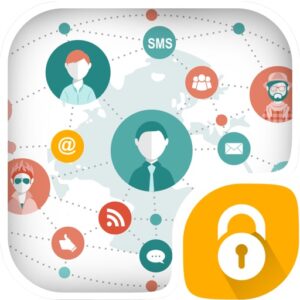Step out on a busy city street and you are sure to spot people tapping away on their smart phones. These folks are constantly glued to their devices as if their life revolves around them. It’s quite astonishing to see how these devices have manipulated our lifestyles. Likewise, smart phones users on average spend 86 percent of their smart phone related time on using apps. This trend has got cyber security experts worrying, as many free apps are actually designed to collect your personal information. Free apps such as flashlight, children’s games and even bible apps have been found to collect user information in the background. However, anyone can avoid this by viewing the permission required for the application in question. The permissions lay out the detail on what hardware and software features will be accessed. For example, a flashlight app should in no way need access to your personal contacts, SD card or access to your gallery. If an app requires more permission than it is suppose to, don’t download it.
 On a different note, social media apps such as twitter, facebook, linked in and other similar apps contain a lot of personal details and can be accessed if your phone ends up in the wrong hands. Anyone who is able to access your phone would be able to simply tap on your facebook and or twitter app and view your timeline. Simply imagining this scenario can be spine chilling to say the least. Consequently, users have recently been using apps like social media vault which can password protect all your social media apps with a single password.
On a different note, social media apps such as twitter, facebook, linked in and other similar apps contain a lot of personal details and can be accessed if your phone ends up in the wrong hands. Anyone who is able to access your phone would be able to simply tap on your facebook and or twitter app and view your timeline. Simply imagining this scenario can be spine chilling to say the least. Consequently, users have recently been using apps like social media vault which can password protect all your social media apps with a single password.
A hacked or compromised social media account can reveal valuable information to a hacker. For example all your personal photos and small details are all that is needed for the hackers to put all the pieces of puzzle together. Once enough personal information is collected, hackers can choose to steal your identity, black mail you or conduct crime using your identity. However, how does one find out if they’ve been hacked? Here are some signs to lookout for.

Statuses and posts not updated by you:
If your account is automatically publishing unusual and weird status updates, chances are your account has been hacked. If someone is posting on your behalf, you need to change your password right away.
Your account has been logged into from a different location:
If you reside in Illinois and someone and you receive a notification that you’ve logged in from California, chances are your account could be hacked. Usually, when your account is logged in from a different location, you are alerted right away. Once again, you should change your password immediately.
You are following strangers:
If you’ve suddenly became friends with unknown people, be it on facebook or twitter, chances are your account has been compromised. In most cases, hackers will post malicious URLs prompting others to click on the link, thus allowing the spread of viruses which can hack even more accounts on social media.
First Signs Of Being Hacked
The first signs of being hacked may include:
1. Unexpected changes to your computer settings
2. Unfamiliar programs running in the background
3. Unusual pop-up messages or browser redirects
4. Unauthorized access to your accounts
5. Unusual activity on your credit or bank statements
6. Receiving strange emails from unknown senders
7. Unusual activity on your social media accounts
Things Happens When Social Media Hacked
If your social media account has been hacked, the first thing you should do is change your password immediately. You should also contact the social media platform to report the incident and request that they investigate and take necessary action. Additionally, you should review your account settings to ensure that your privacy and security settings are set at the highest level. Finally, you should consider using two-factor authentication to protect your account in the future.
Where Can I Check If I Have Been Hacked?
You can check if you have been hacked by monitoring your accounts for suspicious activity. Look for any unusual logins, messages, posts, or other activities that could indicate a hack. Additionally, you can use a service like Have I Been Pwned to check if your email address or other personal information has been leaked.
Things To Do When You Get Hacked
1. Change your passwords.
2. Scan your computer for viruses and malware.
3. Monitor your accounts for suspicious activity.
4. Contact your bank or credit card provider to report any fraudulent activity.
Most Hacked Social Media
The social media platform that is most commonly hacked is Facebook. According to a study by the Ponemon Institute, Facebook is the most targeted platform for hackers, with over 60% of all social media hacks targeting the platform. Other popular social media platforms that are commonly hacked include Twitter, Instagram, and LinkedIn.
Should I Be Worried If I Get Hacked?
Yes, you should be worried if you get hacked. It is important to take the necessary steps to protect your accounts, such as changing your passwords regularly and using two-factor authentication. You should also contact your bank or credit card provider to report any fraudulent activity.
How are hackers detected?
Hackers are typically detected through a combination of techniques such as monitoring network traffic, analyzing logs, and using automated tools to detect suspicious activity. Additionally, companies may employ ethical hackers to test their systems for weaknesses and vulnerabilities.
What Do Most Hackers Want?
Most hackers want to gain access to data or systems for malicious purposes, such as stealing information or disrupting services. They may also be motivated by the challenge of breaking into a system or proving their skills.
What Do Hackers Target The Most?
Hackers typically target networks and websites, as these are the most common and accessible points of entry. They may also target individual computers, mobile devices, and other connected devices. Common targets include databases, websites, financial information, and personal information.
What Do Most Hackers Use To Hack?
Most hackers use a variety of tools and techniques to gain access to systems and networks. Common tools include malware, exploits, and social engineering. Malware is malicious software that can be used to gain access to a system. Exploits are code or scripts that can be used to gain access to a system. Social engineering is the use of deception to gain access to a system.
Way to Know If My Mobile Is Hacked
Yes, there are several ways to check if your mobile is hacked. The most common way is to look for suspicious activity on your device, such as unexpected apps, messages, or calls. You should also check your device’s settings to make sure that no unauthorized changes have been made. Additionally, you should check your device’s battery usage to see if it is draining faster than usual. Finally, if you suspect that your device has been hacked, you should contact your mobile service provider for help.
How do hackers use social media?
Hackers use social media to target potential victims, spread malicious links, and launch phishing campaigns. They may also use social media to spread malware, steal credentials, and gain access to personal information. Hackers may also use social media to spread fake news, create fake accounts, and spread propaganda.
Summary:
Social media is rife with threats and hazards. Sooner or later, at one time or another, we are bound to have our identity stolen if we continue to use social media in an unsafe manner.
